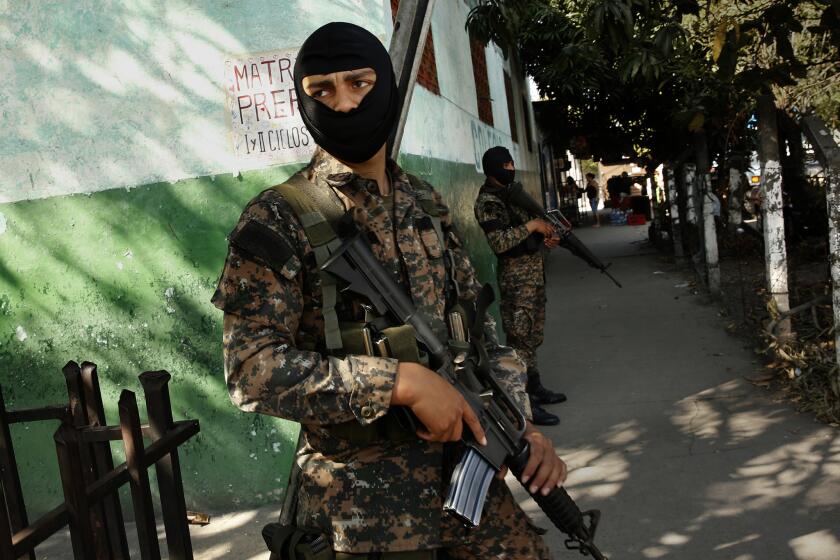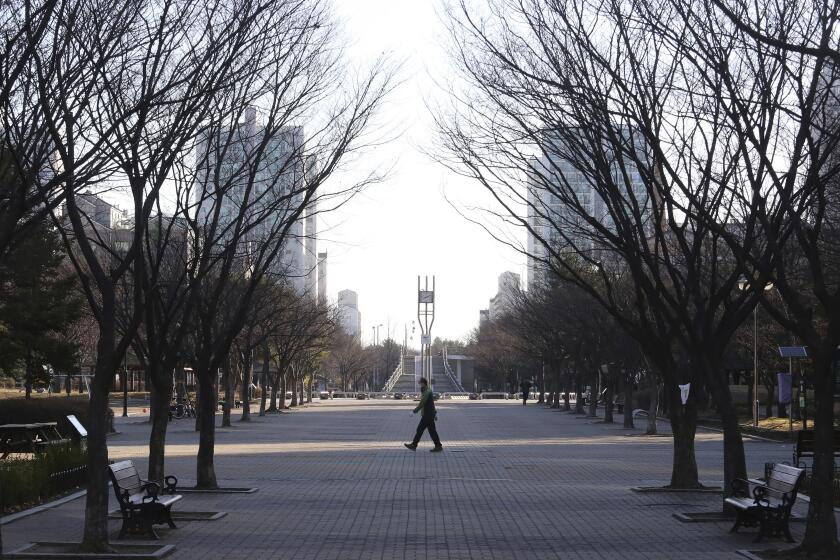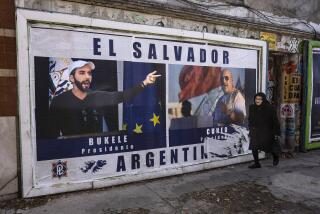Brazil’s president called COVID-19 ‘a little flu.’ Now his supporters are rebelling
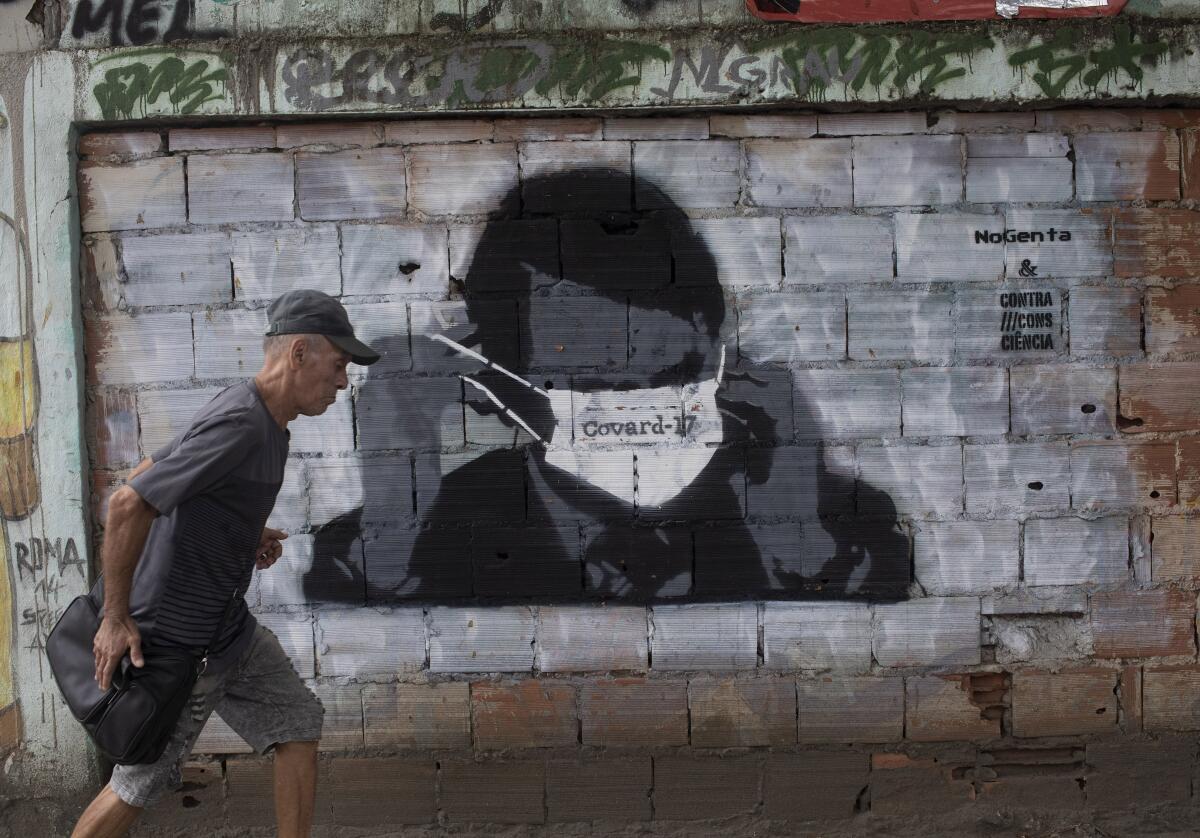
- Share via
RIO DE JANEIRO — Supporters of Brazilian President Jair Bolsonaro stood by him as he insulted women and racial minorities, praised the country’s former military dictatorship and defended the use of torture.
But more and more are drawing a line at his stance on the coronavirus.
Bolsonaro has dismissed COVID-19 as “a little flu” and has criticized media coverage of the pandemic as “hysteria.” Twitter recently deleted two of his tweets that it said spread misinformation about the disease.
He has brazenly contradicted the social distancing guidelines of his own health officials, urging Brazilians to attend large protest rallies and to return to work to prevent economic fallout.
Street gangs in El Salvador have turned from extortion and killing to enforcing social distancing restrictions, often with threats and baseball bats.
It is costing him politically, isolating him from several influential governors who once embraced his policies, and even members of his own Cabinet.
“Don’t follow the president’s directions,” Joao Doria, the governor of Sao Paulo, urged Brazilians, accusing Bolsonaro of putting people’s lives at risk.
Voters are also angry.
For weeks, residents of Rio de Janeiro and Sao Paulo have leaned out their windows each night to bang pots to protest against Bolsonaro. A recent poll shows a majority of citizens believe he is impeding the fight against the virus.
“I think he’s becoming more isolated by the minute,” said Sergio Praca, a political scientist at Getulio Vargas Foundation, a think tank in Rio de Janeiro. “Bolsonaro’s strategy is alienating people.”
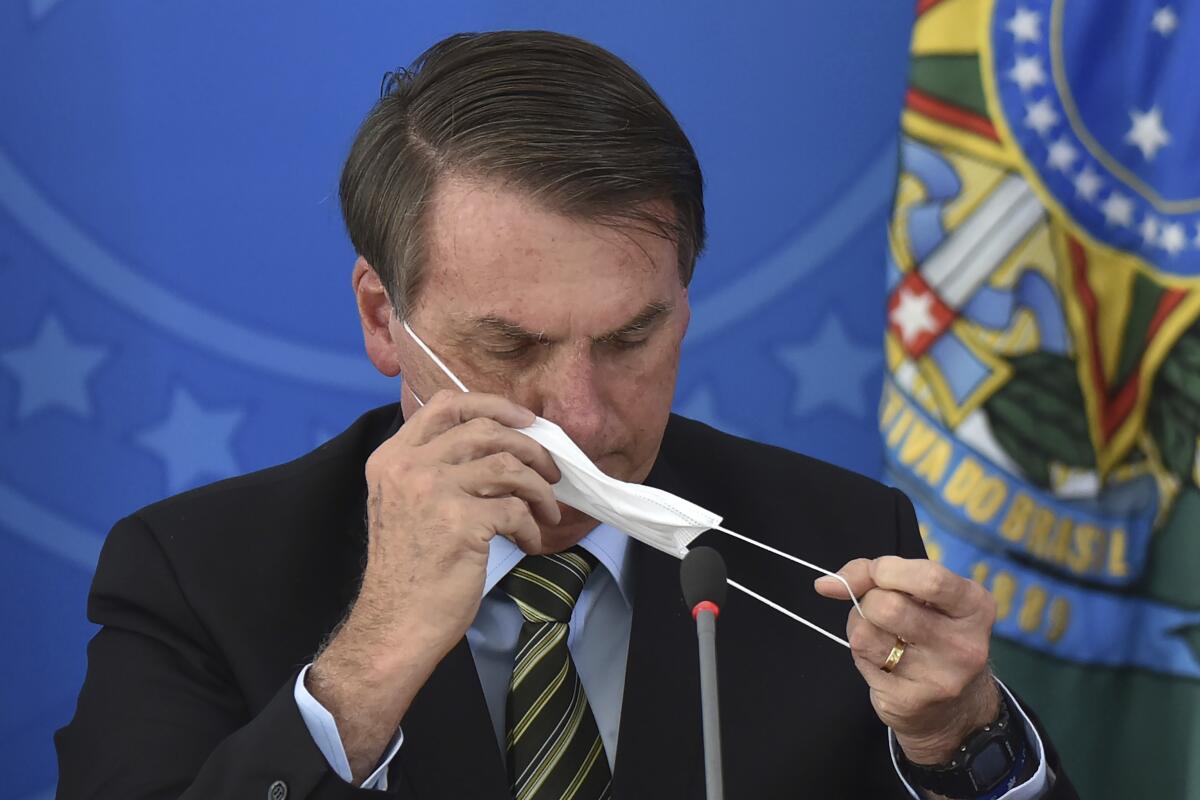
A right-wing nationalist and close ally of President Trump, Bolsonaro won power in 2018 by positioning himself as a straight-talking political outsider who would stamp out crime and corruption.
His response to the pandemic echoes his skepticism about climate change and his rejection of global efforts to mitigate damage to the Amazon rainforest.
It also calls to mind the early reactions of other populist leaders to the coronavirus, including Trump and Mexican President Andres Manuel Lopez Obrador, both of whom initially insisted that widespread quarantines were unnecessary and not worth the risk to the economy.
But unlike Trump and Lopez Obrador, who have both come around to recognize the severity of the crisis, Bolsonaro has continued to lambaste social isolation efforts, even as the death toll in Brazil nears 700 and health experts warn it will soar when the virus takes hold in poor, densely packed neighborhoods.
Brazil’s governors have imposed strict isolation measures, suspending schools, public transportation and closing restaurants, shops and beaches. Twenty four of Brazil’s 27 states have enacted similar restrictions.
Their defiance is striking, because traditionally governors, especially in remote states, have stayed out of national politics.
Bolsonaro has criticized their efforts, dismissing the governors as “job killers.”
He has also publicly clashed with his own health minister, Luiz Henrique Mandetta, who has implored Brazilians to ignore the president’s advice.
Scenes from around the world as coronavirus upends everyday life and customs.
“Please follow the directions of your state governors,” he said in a recent televised address.
“None of my ministers are unfireable,” Bolsonaro warned in response. “Mandetta has to listen to the president more.”
Bolsonaro backed away from his threat after senior military figures intervened, according to media reports. On Monday, Mandetta said he expects to keep his job.
Mandetta, who delivers daily updates about the progression of the virus, has become a well-liked political figure. His approval rating shot up by 21 points to 76% since the onset of the crisis, a survey by polling firm Datafolha showed over the weekend.
The same poll put Bolsonaro’s approval rating at 33%.
Gabrielle Oliveira, a 25-year-old sales consultant who lives in Rio de Janeiro’s north zone, said she voted for the president in 2018 but has been gradually become disillusioned with his policies.
“During this crisis, I made up my mind,” she said. “Finally, I can say I made a mistake with my vote.”
“The attitudes that he’s assuming during this crisis have made me think, ‘What’s going on in his head?’” she said. “He prefers to enter into controversy through unnecessary debates rather than doing something like other countries are doing.”
Still, some of his most loyal supporters gathered across Brazil over the weekend, demanding the end of social isolation and the reopening of businesses.
In some cities, fewer than a dozen people showed up. But much larger groups, clad in the yellow and green that have become synonymous with Bolsonaro’s base, gathered in Sao Paulo and in front of the seat of government in Brasilia.
Marcus Almeida, a 33-year-old soldier from Rio de Janeiro, said he continues to back Bolsonaro even though he wishes the leader would take the coronavirus more seriously.
“I believe there’s massive polarization in the country,” Almeida said. “In this polarization, the one who I support the most is Bolsonaro. He’s the one sitting in the president’s chair ... even though there’s a lot of garbage coming from his mouth.”
Brian Winter, vice president for policy at the Council of the Americas think tank, said that Bolsonaro has been following the patterns of populist leaders.
“They all have a general anti-establishment streak that says that if the media is saying one thing, the truth must be the opposite,” he said. “That can be really dangerous during a global pandemic.”
He said it is too soon to know the long-term impact of COVID-19 on Bolsonaro’s bid for reelection in 2022 or the future of populism around the world.
“Depending on how things go it may enable a new generation of autocrats who promise greater security and therefore health by encouraging people to sacrifice their freedoms,” he said. “Or this may help prove to a new generation why good leadership is important and why having good leaders who embrace democracy and science is a path to success.”
Special correspondent Ionova reported from Rio de Janeiro. Times staff writer Linthicum reported from Mexico City.
More to Read
Sign up for Essential California
The most important California stories and recommendations in your inbox every morning.
You may occasionally receive promotional content from the Los Angeles Times.
